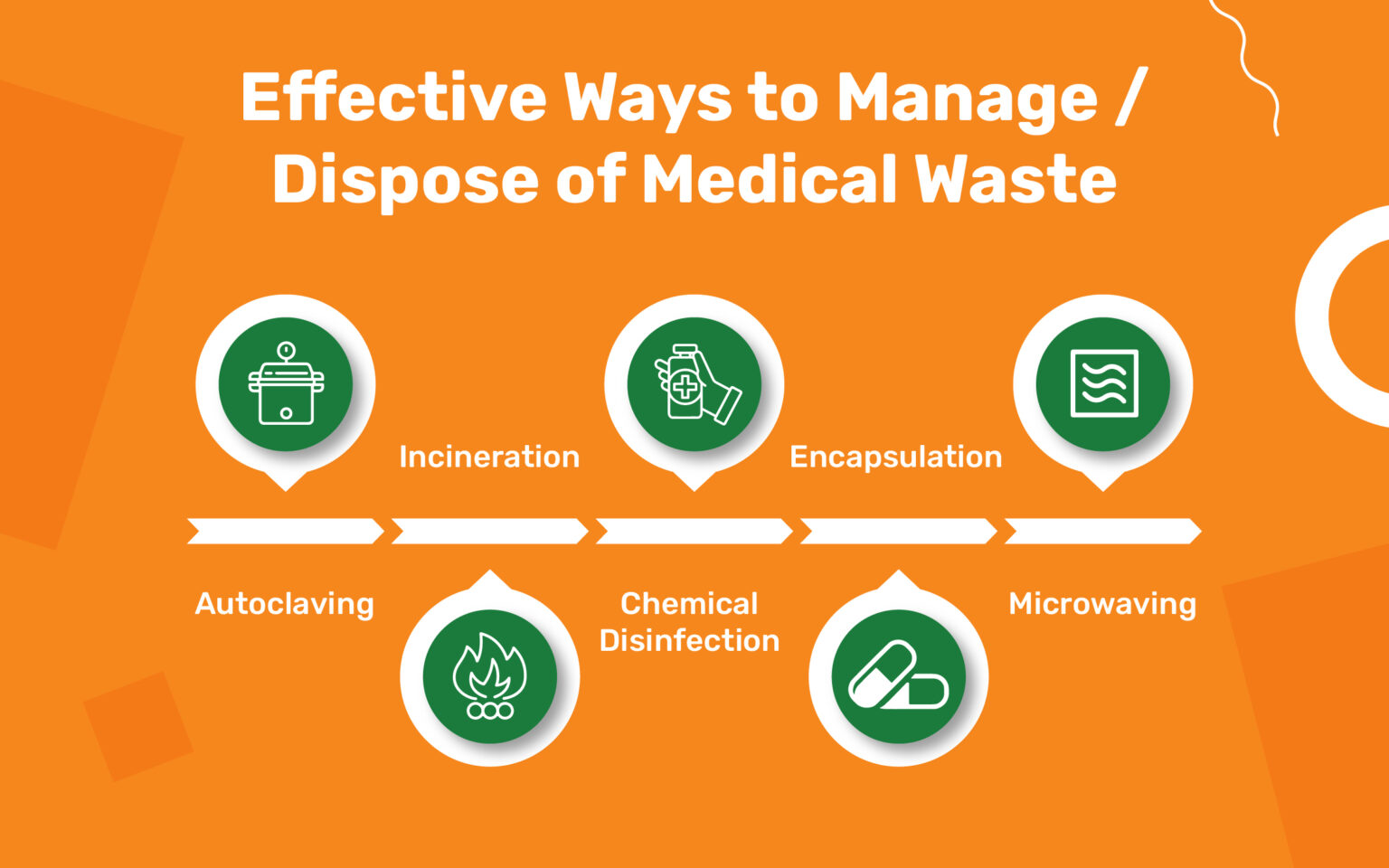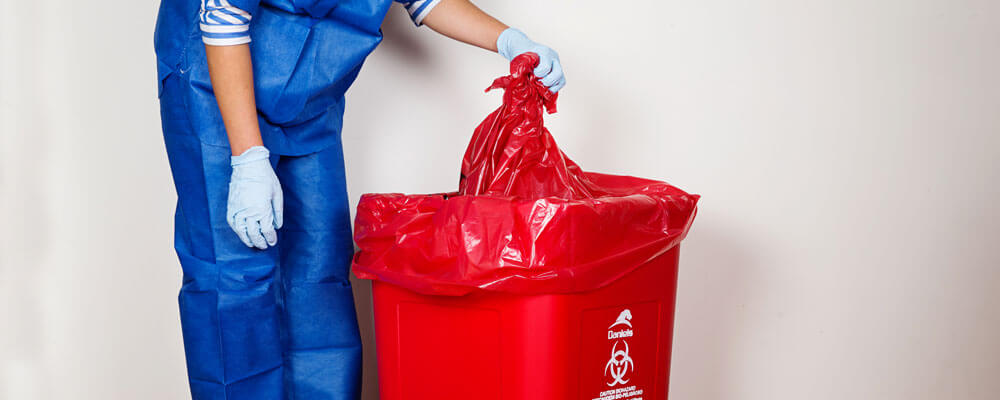Proactive Health Solutions: Choosing the very best Medical Waste Removal Near You
Stay Ahead of Laws: Professional Suggestions on Medical Waste Disposal
In a globe where the healthcare sector is frequently advancing, it is important for clinical facilities to stay in advance of guidelines when it comes to the appropriate disposal of clinical waste. From comprehending the different groups of clinical waste to executing the right collection and partition methods, this conversation will certainly provide workable suggestions and valuable understandings to help centers remain ahead of guidelines in the ever-changing landscape of medical waste disposal.
Recognizing Medical Waste Categories
Recognizing medical waste groups is vital for correct disposal and administration in medical care facilities. Clinical waste refers to any kind of waste generated by health care tasks that might present a threat to public health and wellness or the environment. It is critical to categorize medical waste precisely to guarantee its safe handling, disposal, treatment, and transport.
There are several classifications of clinical waste that healthcare centers require to be accustomed to. One of the most usual categories consist of contagious waste, pathological waste, sharps waste, pharmaceutical waste, and chemical waste. Each category has particular guidelines and laws for its proper management and disposal.
Transmittable waste includes products infected with blood or various other physical fluids, such as gloves, dress, and laboratory societies. Pathological waste describes human cells, body organs, or body components that require special delivery and disposal. Sharps waste includes made use of needles, syringes, and various other sharp objects that can cause injury and transmit infections. Pharmaceutical waste comprises ended, extra, or infected medicines that require mindful handling and disposal. Chemical waste consists of solvents, anti-bacterials, and various other chemical materials made use of in medical care centers.
Staying Up-To-Date With Regulatory Modifications
Staying present with regulatory changes is vital for medical care facilities to ensure compliance and correct monitoring of clinical garbage disposal. medical waste removal service. With policies continuously developing, it is important for healthcare facilities to remain current to prevent charges, fines, and possible damage to the atmosphere and public health
To remain ahead of governing adjustments, medical care facilities should develop a system for tracking and tracking updates. This can be done by registering for regulatory e-newsletters, going to workshops and meetings, and actively participating in industry organizations. Additionally, centers ought to mark a personnel or group responsible for remaining informed and distributing details to appropriate stakeholders.
Normal communication with governing agencies is additionally vital. Healthcare centers should establish partnerships with regional, state, and government firms to guarantee they recognize any changes in policies that might impact their waste administration techniques. This can be done through normal meetings, involvement in public remark periods, and positive interaction with regulative firms.
Moreover, healthcare centers should take into consideration partnering with waste administration firms that focus on clinical waste disposal (medical waste disposal services with WasteX). These business are frequently fluent in the current regulations and can give support and assistance to ensure compliance
Carrying Out Correct Collection and Segregation Methods
To properly take care of medical waste disposal, healthcare centers should develop appropriate collection and partition techniques in conformity with regulatory standards. Implementing these methods makes certain the risk-free handling and disposal of possibly dangerous materials, secures the setting, and decreases the risk of injuries and infections to health care workers and the public.
Proper collection and segregation methods entail the usage of marked containers and labeling systems. Healthcare facilities need to give plainly identified containers for different kinds of medical waste, such as sharps, infectious waste, pharmaceutical waste, and non-hazardous waste. These containers need to be color-coded and plainly marked to avoid confusion and advertise very easy identification.
Additionally, healthcare centers must train their personnel on the correct procedures for collecting and setting apart medical waste. This includes enlightening them on the different sorts of waste, the ideal containers to utilize, and the value of adhering to guidelines and regulations. Normal training sessions and correspondence course should be performed to guarantee that personnel remain updated on best techniques.
Furthermore, health care facilities must establish a system for regular collection and disposal of clinical waste. This may entail partnering with certified waste management business that specialize in clinical waste disposal. These firms will make certain that the gathered waste is carried and thrown away in conformity with regulative requirements.
Selecting the Right Disposal Approaches

Incineration is one of the most reliable and common approaches for disposing of particular kinds of clinical waste, such as pathological waste click this site and sharps. It includes the regulated combustion of waste at heats, minimizing it to ash. Incineration can release unsafe pollutants into the air and contribute to air contamination.

Chemical therapy entails the usage of chemicals to counteract the waste and disinfect. Microwave treatment utilizes microwave energy to warm and sanitize the waste.
Ensuring Compliance With Paperwork and Training
After very carefully taking into consideration the ideal disposal approaches for clinical waste, healthcare facilities must ensure compliance with regulations and minimize ecological impact by implementing effective documents and training treatments. This action is vital in keeping a lasting and risk-free environment for both healthcare employees and the public.

Training is just as crucial in ensuring compliance with laws. Healthcare employees that handle medical waste should obtain appropriate training on waste partition, handling, and disposal procedures. This training ought to cover subjects such as the correct use personal protective equipment, identification of various kinds of waste, and the proper disposal methods for each waste classification. By giving extensive training, health care facilities can equip their personnel to make informed decisions and reduce the risk of improper waste disposal.
Verdict
In verdict, remaining in advance of guidelines in medical waste disposal is important for health care facilities. medical waste removal services. Recognizing the different groups of clinical waste, staying updated with governing adjustments, carrying out appropriate collection and segregation approaches, selecting the proper disposal techniques, and making sure More Info compliance via paperwork and training are all vital steps. By adhering to these standards, health care companies can successfully handle and get rid of of clinical waste in a secure and accountable manner
From understanding the various categories of clinical waste to carrying out the best collection and partition techniques, this conversation will provide workable pointers and useful insights to aid facilities remain in advance of guidelines in the ever-changing landscape of medical waste disposal. - medical waste disposal services with WasteX
The most typical categories include infectious waste, pathological waste, sharps waste, pharmaceutical waste, and chemical waste. Health care centers should give plainly labeled containers for different types of medical waste, such as sharps, infectious waste, pharmaceutical waste, and non-hazardous waste. Healthcare facilities ought to establish a detailed system to videotape and track all facets of clinical waste disposal, including types of waste produced, quantities, and disposal methods used. Healthcare workers that take a fantastic read care of medical waste should receive appropriate training on waste partition, handling, and disposal treatments.